Travel Guide
Where to go?
Greece and her islands tug at people's heartstrings in a way which few other countries do- the unique charm of the people, the blessings of nature, the climate, the sea and the villages, but travellers choosing where to go will reap many benefits from doing a little research, as Greece is as varied as it is beautiful.
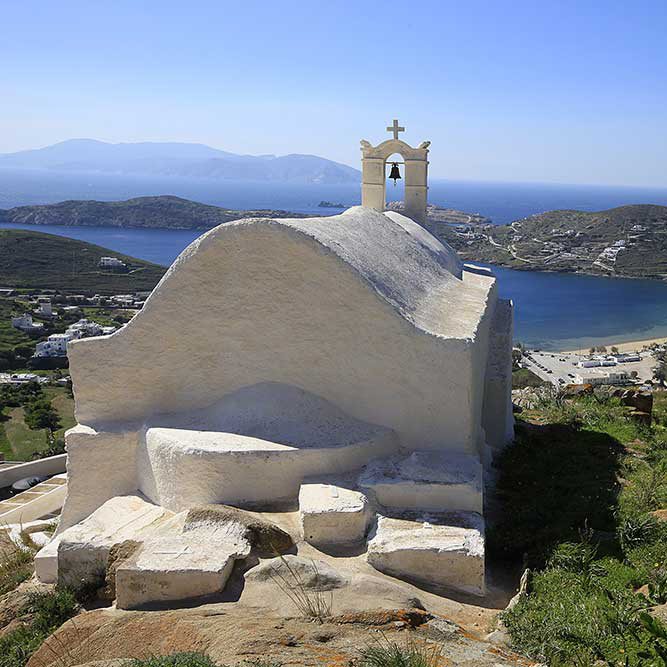
Our travel guide is designed to portray the different faces of Greece so that guests can get a feel for where they might be happiest – and where to avoid – rather than to list to where to eat and what ferries connect to which islands – our local concierges will do that in a more up to date and detailed way.
Let’s start! Greece is close to nature; in the good sense, ( sea, birds, starry skies, full moon over calm water, donkeys, fish jumping at dawn, ripe tomatoes, figs, bare-feet, breezes, and weather-beaten farmers) and in the less good sense, (i.e. mosquitoes, barking dogs, heat, wind, crowing cockerels, flies, storms, power-cuts and cancelled ferries, and the fact that the weather-beaten farmer is also the only one who can get in touch with the plumber who is his son-in-law and is out fishing.) We do present the best houses there are, but the lifestyle in summer on many of the Greek islands is not cutting edge efficiency….
To compensate for that, the sea, the light, the atmosphere, the beauty are we think, incomparable at least in Europe, and the relaxed friendliness of the Greeks captivates more people than the slight air of chaos and improvisation annoys. State of the art telecommunications, well-run infrastructure and a high functioning bureaucracy are not Greece’s claims to fame, although living in less than perfect order does mean that Greeks are inventive, fun-loving, spontaneous, and full of common sense and quick-fix abilities.
If you want to see Greece but feel insecure about committing to an island and can’t decide where to go, then a yacht may be the solution. You can dip into the edited highlights of the islands, while remaining cocooned from the more authentic and rustic side of Greece if that is your preference, (although you are still of course a plaything of the gods when it comes to weather, which is all as it should be and part of the grand old Homeric tradition.) Greece is on a very human scale – you can talk philosophy to a taxi-driver, sip coffee with old fishermen, it is a country to relax and let your hair down, and feel the stress of urban life and social pressures dissolve, and possibly, let the spirits of Greece’s past slip into your mind.
In recent years, service has improved enormously as has infrastructure. Nature conservation and renewed interest in preserving traditions mean that it is possibly the least spoiled of all the popular European tourist destinations, while offering the full range of experiences from full-on glitz to way off the beaten track.
To read more, click the tabs at the top of the page.
Our team of travel experts are ready to help locate the perfect villa or yacht for your needs.
Peace & Quiet
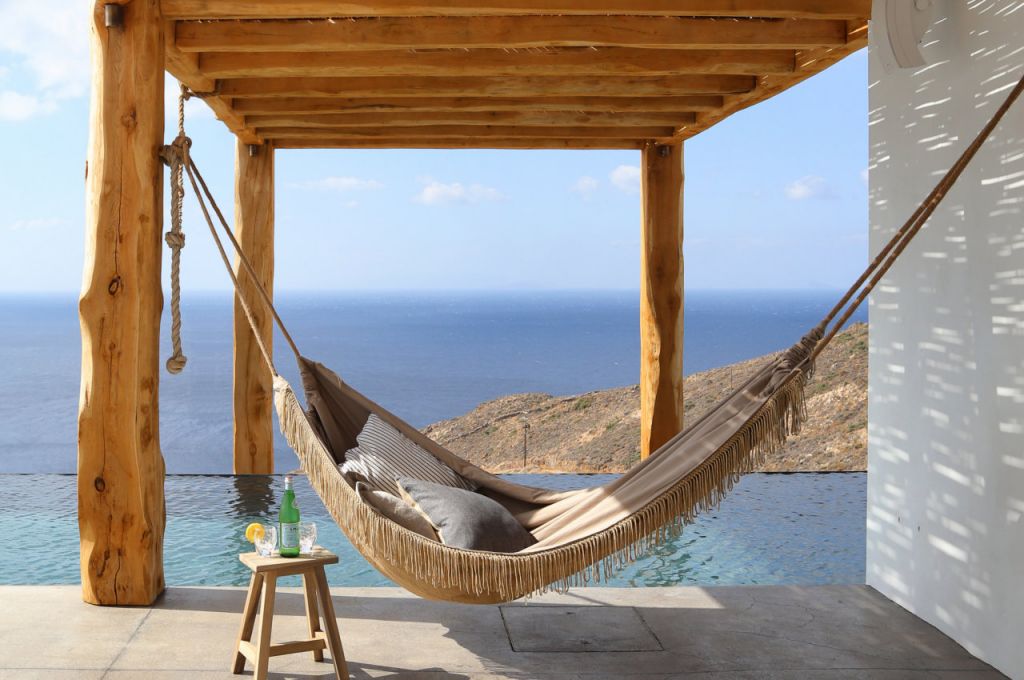
Peace can be the absence of natural turmoil or man-made turmoil. Some destinations are by nature quiet -calm seas, wind-still, gentle contours, lush green and shady groves. Other destinations have more built-in drama with whistling wind and crashing waves. See our Island Group guides. [Hyperlink]
August is high season and very busy on most islands – the easier the international access, the busier the destination, so to get peace and quiet, choose one of the remoter islands, or come outside of the school summer holidays. “Busy” ranges from traffic jams, the need to reserve tables, deckchairs, and excursions well in advance, crowded beaches and bays full of yachts, to towns and villages that buzz till late at night with the usual summer noises. Music from discos, yachts and bars carries amazingly well over water, so for peace and quiet in high season, head for the high hills, ask us about a private island experience or about where to cruise for minimum drama or choose to go off the beaten track.
Destinations for the best chance of summer peace & quiet: Alonnisos, Skopelos, Ithaca, the Peloponnese, Serifos, Sifnos, Samos, Folegandros, Kythnos, Pelion, Kea, Tinos, parts of Crete. [Hyperlinks]
Beaches, Private Beaches, Beach Houses and Privacy
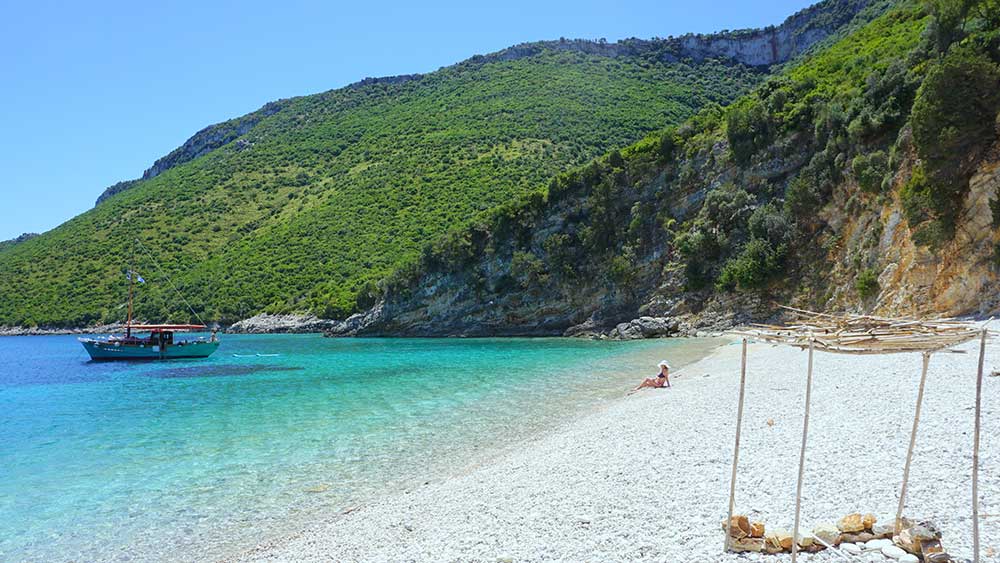
No beach on the Mediterranean is private except for hotel beaches. When a beach is described as “private”, it means that the property has direct access to the beach, that access by road is difficult or non existent, and that few people go there. Some beaches are private but shared among a few houses, while some beaches are public, but a house has been allowed to adapt/furnish a part of it, so people to tend to stay away. There is no legal right to stop people from using a beach as long as they can access it legally. As access to any beach by boat is a universal right, beachfront + August + privacy are not a realistic combination!
Houses on beaches are divine in calm, hot weather, but in windy weather, be prepared for spray and dust. Beachfront houses range from sprawling estates with private sandy beach, private jetties, boats and water sports, to isolated cottages with a narrow track leading down to a beach.
Destinations for beaches & beach houses:
Mykonos, Paros, Ithaca, Corfu, Lefkada, Skiathos, Porto Heli, Tinos, Syros, Spetses, Milos, Kythnos, Mitzela, Crete, Halkidiki – but ask the team!
Yachts

The sea is after all what Greece is all about, and cruising is a fantastic way of exploring a region while staying in one place in luxury. It is also a great way of seeing the smaller and remoter islands, or islands which don’t have villa options. Children are usually royally catered for with adorable crew and masses of water toys and entertainment systems. Adult pampering is a given. In general, for windier destinations, choose the largest yacht you can and avoid tight deadlines. The drawback for some is that it can be a bit isolating if you want to meet the locals and get a feel for Greece, for which villas are a better option. Please see our Yacht section for details, and Island Portraits for more ideas.
Combining a villa stay with a boat is wonderful – we call it our Surf ‘n’ Turf. The best of both worlds and you can even build a trip around two villas on different islands, using the yacht to go from one to the other.
Weather

There are two basic weather patterns in the islands in summer:
1. Calm and hot, possibly more humid, with less reliable weather in Autumn and Spring:
The Ionian islands, the Sporades, the Saronic Gulf islands, Pelion and Mitzella.
2. Windy, dryer and cooler, with calmer and more reliable weather in autumn and spring:
The Cyclades, the Dodecanese. The windiest islands are the Cyclades in late July/August, though the Meltemi, the famous north wind that rages down the islands can blow 120 days a year, and comes in 3 strengths:
Kapelata – blows hats off
Kareklata – blows chairs over
Trapezata – blows tables over.
The Cycladic islanders call the Meltemi “the island doctor” as it keeps the islands cool and fresh.
Child Friendly
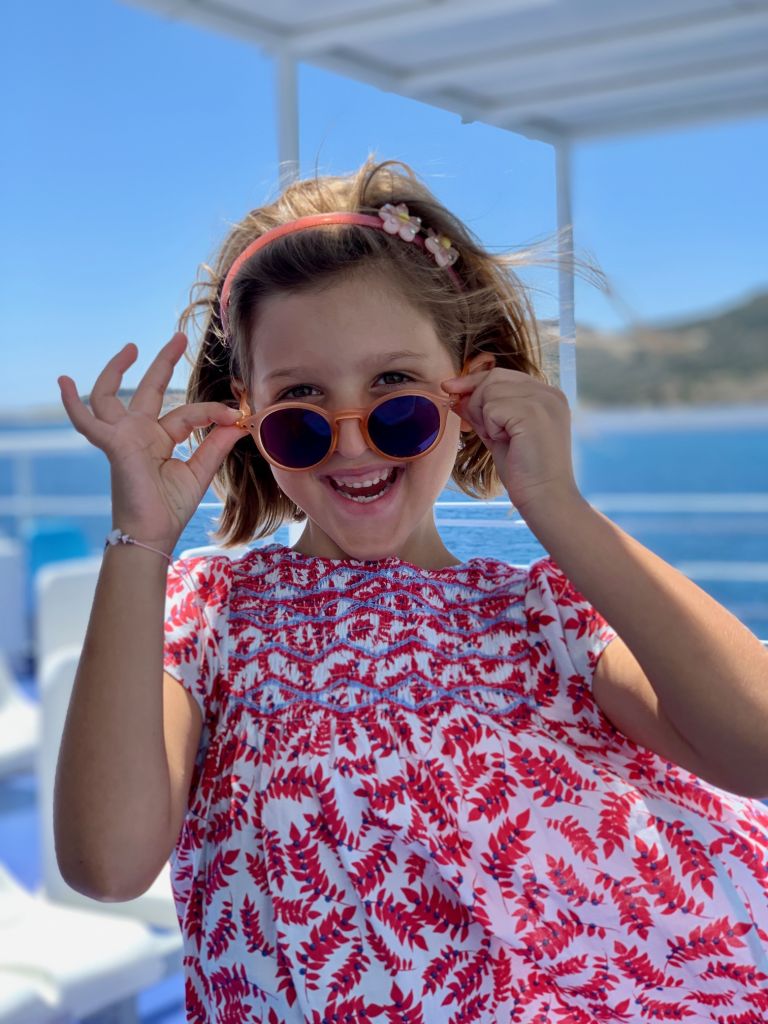
A good area for misunderstanding between Europeans and Americans; Child-friendly in Europe tends to mean a house where children can’t do too much damage, while for U.S. guests, child-friendly means a house adapted to avoid as many accidents to the child as possible.
Greeks adore their children and spoil them rotten, feed them till they are fit to burst, try and run their lives, marriages etc, and when children are little, they supervise them at all times. They do however assume that bigger ones are intelligent beings with a wish to survive. They do not consider minor drops from terraces, direct access to the sea, sharp edged furniture, steep staircases, open fire-places or unfenced swimming pools a particular hazard, don’t change their houses around in any particular way to accommodate children, and take a generally robust view about things that Americans could find alarming.
Preparations for a child-rich group might include providing loose covers for furniture and removing valuable objects, supplying toys, cots, high chairs etc. Some houses have playgrounds, and we can provide nannies if requested. If you are particularly concerned about safety, please advise us and mention your specific concerns, so that we can try to minimise distress to both guest and owner!
High Season
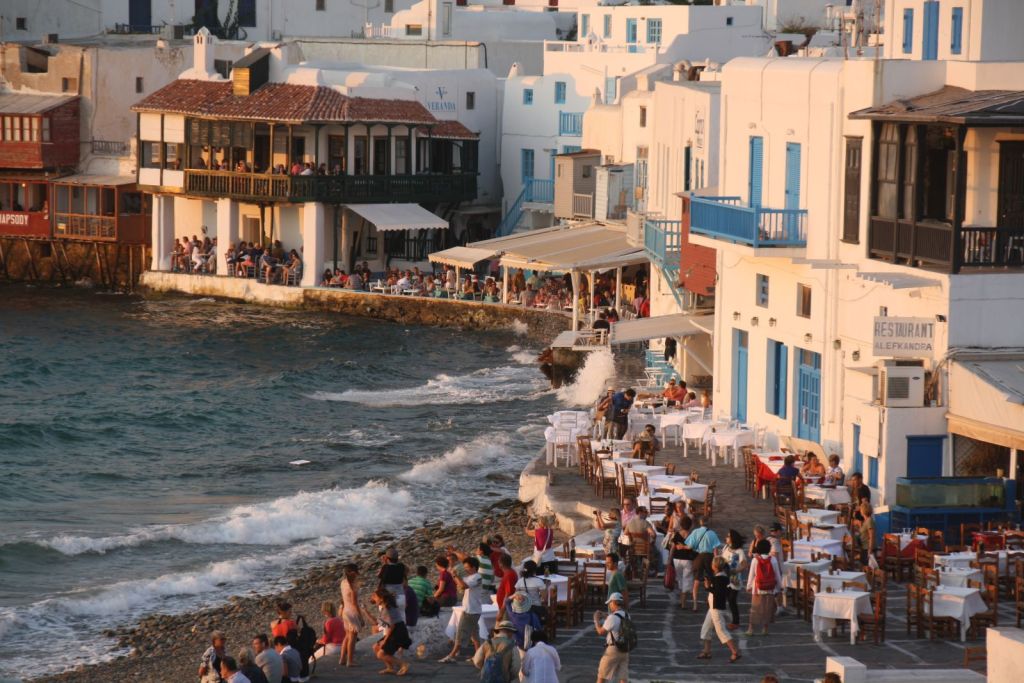
High season starts in early July and continues to the first days of September. In Santorini and Mykonos, tghe high season lasts longer.
Advantages: Well, the weather is pretty well guaranteed to be good! Everything is open, travel is easy, life is fun, and you can find anything you need.
For those who love the life, colour and buzz of summer, this is the best time to go, to people spot, to enjoy all the shops, bars, tavernas etc that come to life in summer, and close off season.
Disadvantages: Crowds are inevitable and islands like Mykonos, Corfu, Santorini, Paros and Spetses, and islands with an airport, are really very full – beaches and restaurants are crowded, you must reserve rental cars, flights etc well ahead.
Off Season
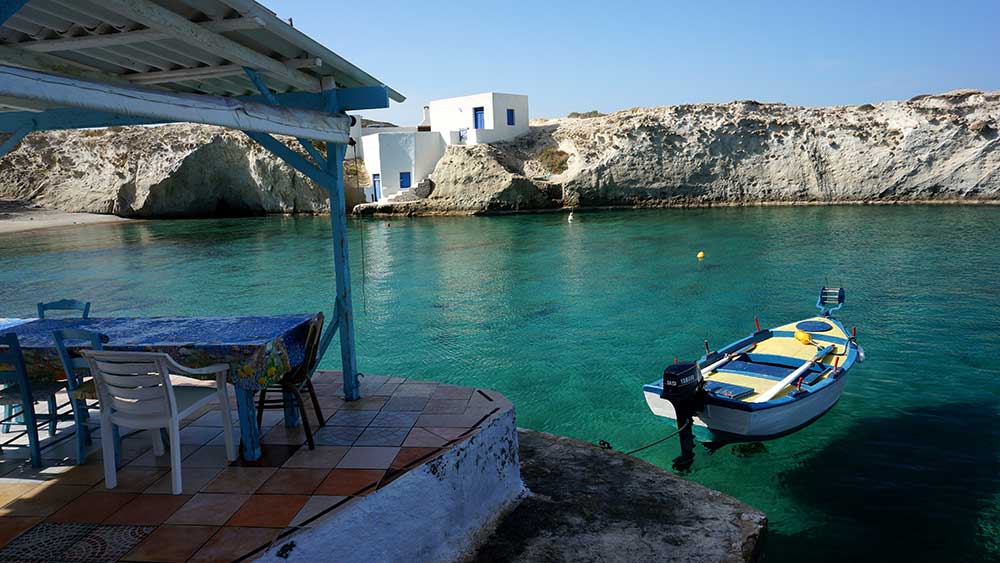
Advantages: The quality of life improves and the prices drop. Food is better, people have more time for you, beaches are quiet if not deserted, islands revert to being real places rather than tourist resorts. Spring and autumn bring seasonal delights like artichokes, strawberries, chestnuts, pomegranates and grapes, nights are cooler, this is the best time for walking, exploring, visiting archaeological sites without coachloads of hot and bothered tourists. and some of the historical commemorative festivities are worth timing a trip for. In spring, the flowers run riot, birdsong is deafening, and everything is fresh and sparkling. Days are long and the Easter celebrations are a highlight of every Greek’s year.
In autumn, the sea is warm and clean, the sun is milder, the evenings are longer. Catch the grape picking and the olive harvest, enjoy the fragrance of olive branch prunings on a bonfire, “raki” ( Greek schnapps) festivals in the mountains of the mainland, harvest time in the rural villages. Flowers are over, but fruit and wine abound. The crickets finally shut up and there is a very mellow quality to life.
Disadvantages: Bars and tavernas may be shut, ferry and plane timetables not convenient, (and sometimes not even published until after Easter!) islands hard to get to due to bad weather. In many areas, from September, weather is no longer high summer – be prepared for some rain/wind/cloud. Head south and south-east for the remnants of summer.
In spring, weather is not yet proper summer – you could get 80 degrees and sun, you could get a cold, windy spell. The sea is cold, the days are long and the sun is extremely strong though the cooler air temperature will fool you – factor 30 sun cream!
On the Beaten Track
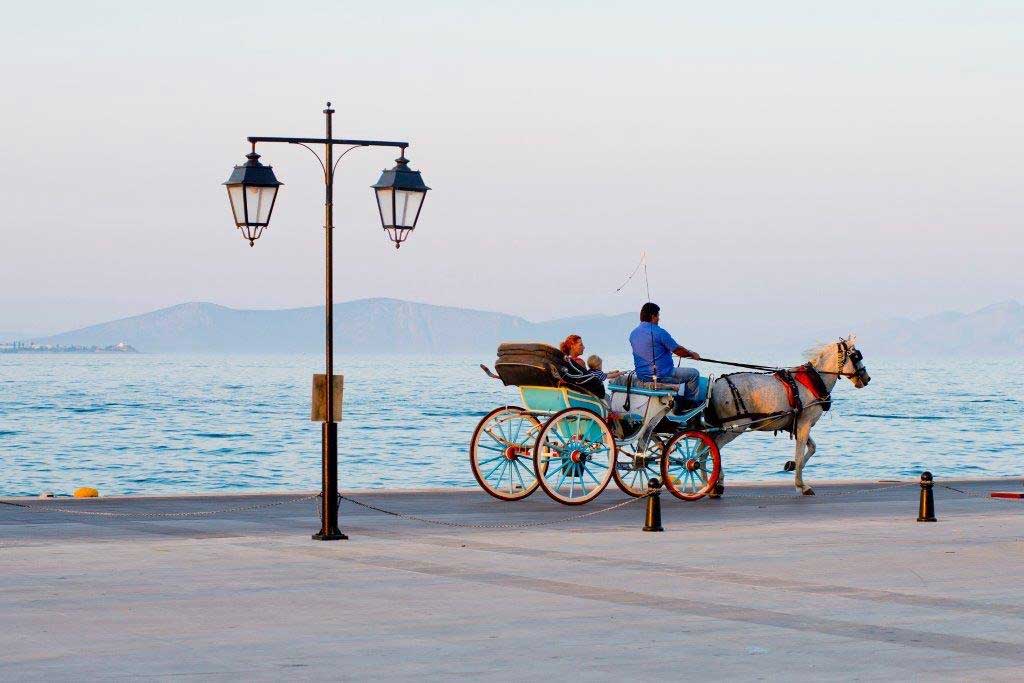
Advantages: Easy access via airports and good, fast hydrofoils, boats and ferries. Better infrastructure such as broadband lines, easier to source things like gluten-free/lactose-free groceries, more sophisticated dining, shopping, organised beaches and plenty of water-sports. There is more to keep youngsters and party-goers happy. See and be seen. Rrmember, the beaten track is usually beaten for a good reason – pretty villages, great accommodation, good services and wonderful beaches. These destinations are bucket list for a good reason.
Disadvantages: Easy access and fame bring crowds and higher prices. Local and regional tourism is not always of the highest standard and some over-building is inevitable.
Off the Beaten Track
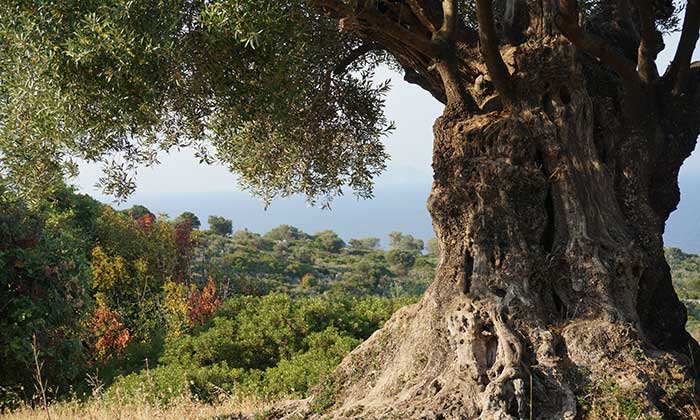
Advantages: Difficult access means less people, unspoilt landscape, uncrowded beaches, traditional values and village life. Get away from it all and slow down. True hospitality offered by locals, another world from the one you probably come from. Can be totally idyllic.
Disadvantages: Access is harder – either by boat only, by boat from an island with an airport, or only via Athens, in which case an overnight stay in Athens might be needed – turn this into a plus though and ask us about our Athens suggestions. Infrastructure such as telephone lines and power can be a bit dodgy, especially in or after storms. Broadband and mobile reception can be spotty. Telephone lines going over the hills tend to get nibbled by goats…. Rustic life can also mean cocks crowing, dogs barking, and, sadly, inadequate litter control. These islands are generally harder to get to. No Nobu’s or fusion cooking, (or should this be under advantages?) Houses tend to be less luxurious as equipping and furnishing houses on these islands is complicated, so owners try to keep it simpler.









